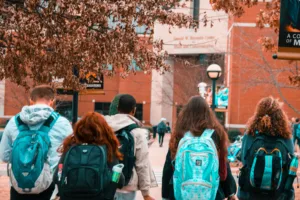Education is a transformative journey that has the potential to shape students’ lives and prepare them for the future. As educators, it is our responsibility to go beyond traditional teaching methods and embrace innovative and out-of-the-box approaches that can truly make a difference. This article explores the best practices and strategies for teaching in a unique and impactful manner, aiming to inspire educators to think creatively and unleash the full potential of their students.

Embracing Active Learning:
Active learning is a student-centered approach that encourages students to engage actively in the learning process. Instead of passively receiving information, students are actively involved in discussions, problem-solving activities, group projects, and hands-on experiments. This approach fosters critical thinking, collaboration, and creativity, allowing students to develop a deeper understanding of the subject matter and apply their knowledge in real-world situations.
Incorporating Technology:
In today’s digital era, technology has become an integral part of our lives, and it has the power to revolutionize the way we teach and learn. By incorporating technology tools such as interactive presentations, educational apps, online resources, and virtual reality experiences, educators can create a dynamic and immersive learning environment. Technology not only enhances students’ engagement but also provides opportunities for personalized learning and exploration.

Encouraging Problem-Based Learning:
Problem-based learning is a powerful teaching method that involves presenting students with real-world problems or challenges and guiding them to find solutions through research, critical thinking, and collaboration. This approach nurtures students’ problem-solving skills, creativity, and ability to work in teams. By tackling authentic problems, students develop a deeper understanding of the subject matter and gain practical skills that are applicable beyond the classroom.
Fostering Creativity and Innovation:
Creativity is a valuable skill that can unlock new perspectives, fuel innovation, and empower students to think outside the box. Educators can foster creativity by providing opportunities for artistic expression, encouraging open-ended projects, and promoting divergent thinking. By nurturing creativity, students develop the ability to approach challenges with fresh ideas, take risks, and find unique solutions.

Cultivating Critical Thinking:
Critical thinking is the ability to analyze information objectively, evaluate evidence, and make informed decisions. By incorporating activities that stimulate critical thinking, such as debates, case studies, and problem-solving scenarios, educators can empower students to become independent thinkers and active participants in their own learning. Critical thinking skills are crucial for academic success and lifelong learning.
Promoting Active Classroom Discussions:
Meaningful classroom discussions provide a platform for students to express their thoughts, share perspectives, and engage in intellectual discourse. By creating a safe and inclusive environment that encourages respectful dialogue, educators can foster a culture of active participation and critical thinking. Classroom discussions enhance students’ communication skills, empathy, and understanding of diverse viewpoints.

Connecting Learning to Real-World Contexts:
To make learning relevant and meaningful, it is important to connect classroom concepts to real-world contexts. By demonstrating how the knowledge and skills learned in the classroom are applicable in everyday life, educators can inspire students and enhance their motivation to learn. This can be achieved through field trips, guest speakers, community projects, and opportunities for students to apply their learning in practical settings.

Providing Personalized Learning Opportunities:
Every student has unique strengths, interests, and learning styles. By incorporating personalized learning approaches, such as differentiated instruction, project-based learning, and individualized assignments, educators can cater to the diverse needs of their students. Personalized learning enhances student engagement, fosters a sense of ownership over learning, and allows students to progress at their own pace.

To sum up, Teaching in an out-of-the-box manner is an opportunity to make a lasting impact on students’ lives. By embracing active learning, incorporating technology, encouraging problem-based learning, fostering creativity and innovation, cultivating critical thinking, promoting active classroom discussions, connecting learning to real-world contexts, and providing personalized learning opportunities, educators can create a transformative learning experience that prepares students for success in the ever-evolving world. Let us step out of our comfort zones, explore new teaching approaches, and empower our students to reach their full potential.
—————————————————————————–
Putting Students First: Transforming Education through Student-Centric Pedagogy.
From Tradition to Excellence: Exploring the Renowned Aspects of Indian Education.





